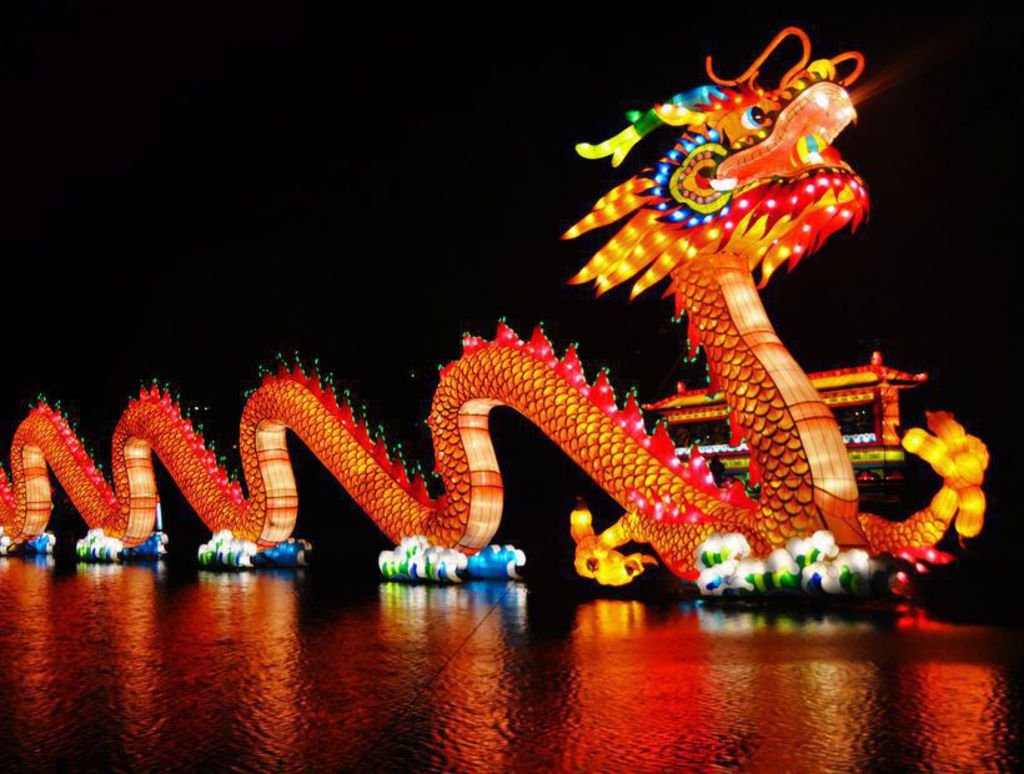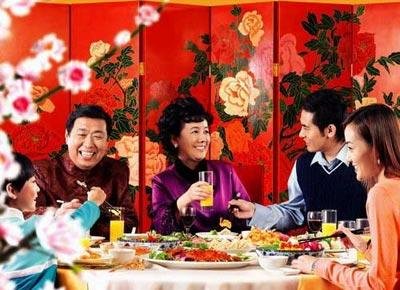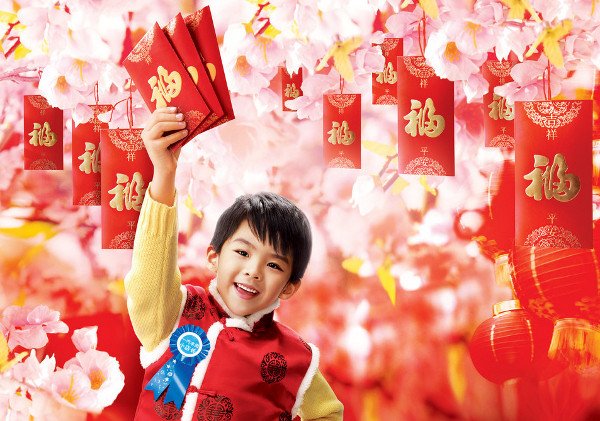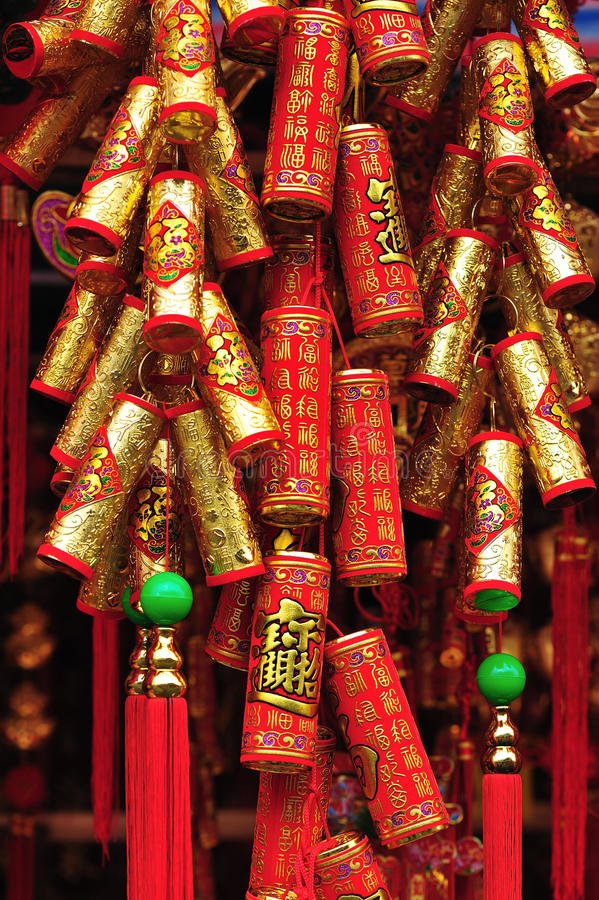The Chinese new year
My cousin is expatriate and lives in Singapore. She told me that there was preparing the Chinese New Year and it was the event of the year. This is one of the most important moments for the Chinese.

I remember that my grandmother who had been traveling had been to China during the New Year and I remember the dragons in the processions, it's super beautiful.
Chinese New Year is the first day of the first month of the Chinese calendar. It's the beginning of the spring festival that takes place over a fortnight and ends with the lantern festival.
Since the Chinese calendar is a luni-solar calendar, the Chinese New Year date in the Gregorian calendar varies from year to year, but still falls between January 21st and February 19th, during the second new moon since winter solstice when the sun is in the sign of the Aquarius. It is, like all the beginnings of Chinese lunar months, the first day of a new moon.
The New Year is officially celebrated in the People's Republic of China, Taiwan, Hong Kong and Macao, as well as in some Asian countries where the influence of Chinese culture is important. But also in Singapore, Malaysia, the Philippines, Indonesia, Thailand or Vietnam.
Days of leave are granted during the Chinese New Year.
It is a period of strong migration for the Chinese, indeed, there are many who strive to join their family, from abroad sometimes, so there is a lot of traffic jams on the roads and congestion in the stations and airports.
Some Asian families travel from one end of the world to another, from Europe to Asia or Europe to America, to join other family members.
Celebrations
The general practice is that one tries to start afresh after getting rid of the bad influences of the past year, accompanied by signs of auspiciousness.
The passage of the year is made on the night of the last day of the twelfth month. The word meaning year is considered to be originally the name of a monster, Nian, who used to roam around the villages one night a year, forcing the inhabitants to cuddle up and watch until he leaves early in the morning . The main celebrations include a New Year's Eve dinner with dishes with auspicious names, followed by a night of waking, a guarantee of longevity, that some occupy to play mahjong, the distribution of Christmas presents contained in red envelopes, the ignition of firecrackers has wicks to chase bad influences.
The week before the New Year, there is the New Year's Eve, a farewell ceremony to the God of the Foyer whose effigy is stuck in the kitchen. According to the beliefs, he must make a long trip to report, as every year, the good and bad actions of the family to the Emperor of jade. To obtain clemency, sticky foods, such as sweets, are deposited in front of his image, hoping to prevent him from saying bad things; some stick directly a candy on the mouth of his portrait. This one is burned, and the Genie flies away with the smoke. A new portrait will be posted a few days later, signaling his return.

The big cleaning of the house is done. On the last day, greetings are written on red paper, a symbol of luck. These are auspicious characters like fú "happiness", or chūn "spring", often stuck upside down because toppling means to arrive.
A reversed fu therefore means that happiness has arrived. Traditionally, on each side of the door jambs, one sticks a strip of red paper on which is written a verse; the two lines answer each other and constitute a parallel inscription.
Provisions are made, they include many things to nibble with family: watermelon seeds, dried fruits, sweets, ... It was previously a welcome opportunity to renew his wardrobe, but with the development of the lending industry. to wear, this custom has lost some of its value.
New Year's Eve
The New Year's meal is often held at the home of the elders of the family. In areas with a traditional way of life, because of patriarchal custom, it is the paternal family.
The dinner can only begin when the whole family is present, empty places are reserved for members who can not attend the meal. It is generally hearty and often includes symbolic dishes to ensure health.
So the fish for the surplus must be present at every New Year's meal to ensure that there will be surplus every year and that we will never miss anything; some even take care not to finish it, in order to render more completely its symbolic meaning. In the north of China, a dish of ravioli is usually served because the shape is reminiscent of the old ingots.
The traditional dessert is niángāo, the cake of the year meaning to grow; eating it is a guarantee of growth in all desired areas.

Red envelopes containing money are offered. Traditionally, they were distributed by elders to children and unmarried youth, and above all had the symbolic value of bringing good luck throughout the new year. During the solemn distributions by the elders, the person who will receive the envelope sends them a wish, most often is congratulations and make a fortune.
Many red envelopes contain a small amount of money, but sometimes this is the means by which a professionally active person gives his elderly parents or children a whole year's worth of spending money. During visits to family and friends, in the following days, it is customary to offer an envelope to the children of visitors or visitors; many are therefore careful to stock up on small bills before the holiday season.
The children were allowed that night to burst firecrackers or burn bengal fires, waiting for the chain of firecrackers that each household had to turn on the arrival of the first day of the year. Nevertheless, because of the more and more frequent accidents due to urban concentration, many countries have banned private firecrackers. Lighted electric models with sound are available.
An old custom is that we go to bed as late as possible that night, because it would be a guarantee of longevity; this is called "mounting the guard of the year".
A television largely helps to fulfill this objective, but a game is also often chosen, especially since, for some, it is good to try his luck during the New Year's Eve. In some areas, gambling usually prohibited , were exceptionally allowed during the Spring Festival.
New Year's Day

If local regulations allow, a chain of firecrackers is lit from eleven o'clock or midnight. In the morning, after a short rest, many go to the local temple, then to the ancestral tombs if they live nearby. It is considered that the earlier the visit to the temple, the more luck you will have in the year. It happens that the faithful are massed in front of the big temples before the opening of the doors to be the first to plant his wand of incense in the incinerator. In some cities, a temple opens at midnight, the first hour of the first day. Some take this day at least one vegetarian meal.
The first day was theoretically devoted to visits, starting with the most important people, such as senior parents or superiors.
This activity is called "greet the year" but nowadays the phone is widely used.
On New Year's day, one must theoretically wear new clothes, and many like that red, auspicious color, appear there. We do not do housework and if we must absolutely sweep rubbish fallen on the ground, do not put them outside the home because it would symbolize a loss. Some people think it's bad to have a big toilet that day.
The second day is traditionally when married women visit their families with children and husband.
The fifth day is usually when businesses reopen. In Hong Kong it is the birthday of the God of wealth.
The seventh day was for some the day when everyone changed their age, exact birth dates being once kept secret. Others, however, believe that age changes on the first day of the new year.
The eighth or ninth day, depending on the region, is the birthday of the god of Heaven assimilated to the Jade Emperor. A ceremony is held at home or at the temple late at night, at the beginning of the new day.
Finally, the fifteenth of the first month is the last day of the Spring Festival, marked by the Lantern Festival.
This year, the Chinese New Year will be held on February 16, 2018. The Chinese will return to the Year of the Earth Dog, which begins on February 16, 2018 and ends on February 4, 2019 to make room for the Pigmeat sign.

